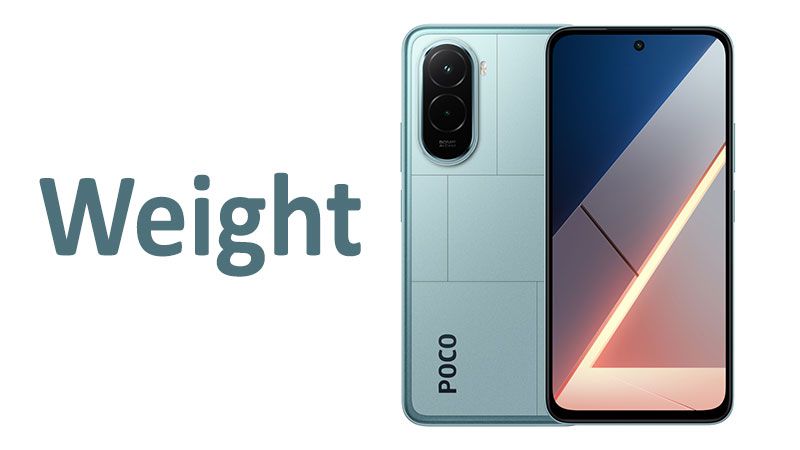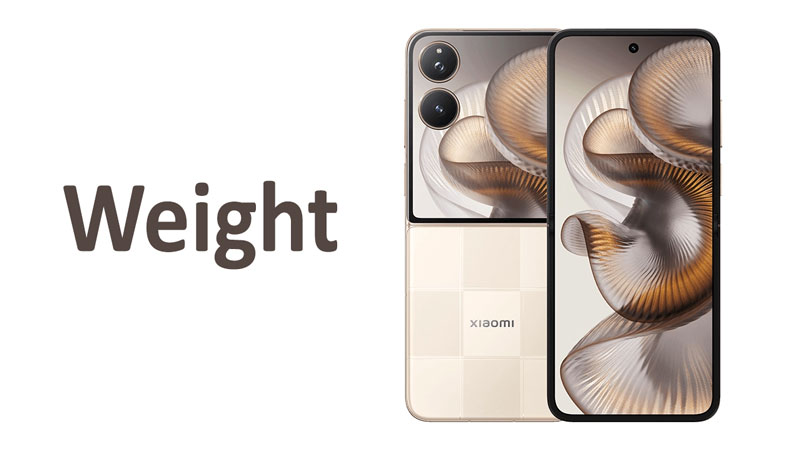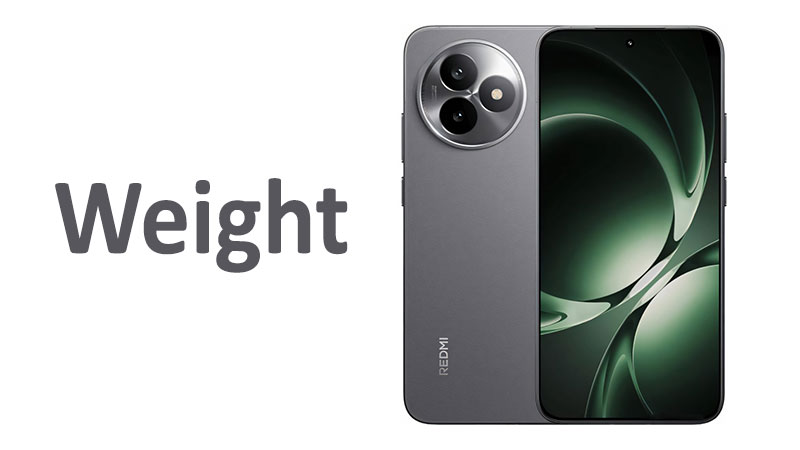The weight of a smartphone is a crucial factor in its design and user experience. It affects how the device feels in your hand, its portability, and overall comfort during extended use. The Xiaomi Poco M7 Plus, a notable entry in the budget-friendly smartphone market, has a specific weight that is a direct result of its design choices and component selection. Understanding the Xiaomi Poco M7 Plus weight is essential for potential buyers. It helps to set expectations and compare the device accurately against its competitors.
This article provides a comprehensive and detailed analysis of the Poco M7 Plus’s weight, exploring the factors that contribute to it and how it stacks up against other phones. We will cover the exact weight in both grams and ounces, review the pros and cons of this specific weight, and provide key insights for anyone considering this phone.
A Detailed Breakdown of the Xiaomi Poco M7 Plus Weight
The official specifications for the Xiaomi Poco M7 Plus weight are clear and precise. The device weighs 217 grams (7.65 ounces). This figure is significant and places the Poco M7 Plus firmly in the heavier category of modern smartphones.
The weight is a direct consequence of several key design decisions. The most prominent factor is the massive battery. The Poco M7 Plus is equipped with a colossal 7,000mAh battery. This is one of the largest batteries available in its price segment. This huge power cell is the primary contributor to the phone’s heft.
Another element is the phone’s large display. The Poco M7 Plus features a 6.9-inch screen. This large physical size necessitates a more substantial body and frame. The display itself and the protective glass also add to the overall mass. The materials used in the phone’s construction, such as the plastic frame and back, are also a factor, though to a lesser extent than the battery.
Specialized Comparisons: Poco M7 Plus vs. Competitors
To truly understand the importance of the Xiaomi Poco M7 Plus weight, it is helpful to compare it to other smartphones. This puts its 217g (7.65 oz) weight into proper context.
Vs. the Predecessor (Poco M6 Plus):
The Poco M6 Plus was a lighter phone. It weighed in at 205.4g (7.23 oz). This difference is notable. The M7 Plus is approximately 11.6g heavier. This added weight is almost entirely due to the upgraded battery. The M6 Plus had a 5,030mAh battery, while the M7 Plus has a 7,000mAh battery. This trade-off is central to the M7 Plus’s identity.
Vs. Other Mid-Range Phones:
Many mid-range phones are lighter. For instance, some popular models hover around 185g to 200g. A phone like the Samsung Galaxy A36, for example, is often lighter. The Poco M7 Plus is not designed for those who prioritize a lightweight feel. It is built for a specific user: one who values battery life above all else. Its weight is a badge of its endurance.
Vs. Flagship Phones:
Some flagship phones, particularly those with large displays and advanced camera systems, can be quite heavy. However, they often use different materials like aluminum or glass, which can also contribute to their weight. The Poco M7 Plus competes with them in terms of sheer mass, but for different reasons. The Poco’s weight is a function of its value proposition: a massive battery at an affordable price.
Pros and Cons of the Poco M7 Plus Weight
The weight of a phone is not inherently good or bad. It is a feature with its own set of advantages and disadvantages. For the Poco M7 Plus, its weight is a double-edged sword.
Pros:
- Exceptional Battery Life: The primary benefit is the 7,000mAh battery. This allows for multi-day usage on a single charge. It is a game-changer for heavy users, travelers, or anyone with “battery anxiety.”
- A “Substantial” Feel: Some users prefer a phone that feels solid and well-built. The weight of the Poco M7 Plus provides a feeling of durability and quality. It doesn’t feel flimsy or cheap.
- Improved Grip and Stability: The added weight can make the phone feel more stable in hand. This is particularly useful for gaming or media consumption. It reduces the chance of accidental drops.
Cons:
- Hand and Wrist Fatigue: The most significant drawback is the potential for fatigue. Holding a 217g phone for long periods, whether for calls, reading, or gaming, can tire the hand and wrist.
- Pocket Bulge: A heavier phone is more noticeable in a pocket. It can cause a significant bulge and may be uncomfortable, especially in tight clothing.
- Reduced Portability: For users who want a light and airy device that they can easily forget is in their pocket, the Poco M7 Plus is not the ideal choice. Its weight makes its presence known.
Important Points for Potential Buyers
When considering the Xiaomi Poco M7 Plus weight, a buyer should think about their own usage patterns and preferences. The weight is a key trade-off for a specific set of features.
- Battery is King: The M7 Plus is for the user who prioritizes battery life above all else. If you are always looking for a power outlet, this phone is a fantastic solution. The weight is the price you pay for that freedom.
- Ergonomics are Personal: Try to get a feel for a phone of a similar weight before purchasing. Visit a store and hold a phone that is around 220g. This will give you a realistic idea of what it will feel like to use every day.
- Accessories Matter: A case will add to the phone’s weight. A slim case might add 10-15g, while a rugged, protective case could add much more. This is an important consideration.
- Not for Everyone: The Poco M7 Plus is not a one-size-fits-all device. It is a niche product for a specific audience. Its weight is a feature, not a bug, designed to serve that audience’s needs.
Conclusion
The Xiaomi Poco M7 Plus weight of 217g (7.65 oz) is a defining characteristic of the device. It is a direct result of its most compelling feature: the massive 7,000mAh battery. This weight places it in the heavier category of modern smartphones.
This weight is a deliberate design choice by Xiaomi. It signifies a clear focus on endurance and power. The phone offers a solid, substantial feel that many users will appreciate. However, it comes at the cost of being less portable and potentially causing hand fatigue during prolonged use.
For the buyer, the decision comes down to a simple trade-off. Are you willing to carry a heavier phone for the peace of mind that comes with multi-day battery life? If your answer is yes, the Poco M7 Plus is an excellent choice. Its weight is a testament to its long-lasting performance. If a lightweight, nimble device is what you seek, you might need to look at other options. The Poco M7 Plus is a specialist, and its weight is a core part of its identity.
FAQ
The Poco M7 Plus is on the heavier side. Its 217g (7.65 oz) weight may feel substantial. For short-term use, it’s fine. For extended use, some users might experience hand or wrist fatigue.
The main reason for its weight is the large 7,000mAh battery. This is a deliberate design choice to provide class-leading battery life. The large 6.9-inch display also adds to the overall mass.
The Poco M7 Plus is heavier than the Poco M6 Plus. The M6 Plus weighed 205.4g (7.23 oz). The M7 Plus’s added weight is due to its significantly larger battery.
The substantial weight can contribute to a feeling of sturdiness. While a heavier phone might withstand some knocks, it also has a higher potential energy when dropped, which could lead to more significant damage. Its IP64 rating for dust and splash resistance is a better indicator of durability.
This is a personal choice. For many users, the benefits of the huge battery outweigh the inconvenience of a heavier phone. For those who prioritize a lightweight design, the weight could be a major drawback.



